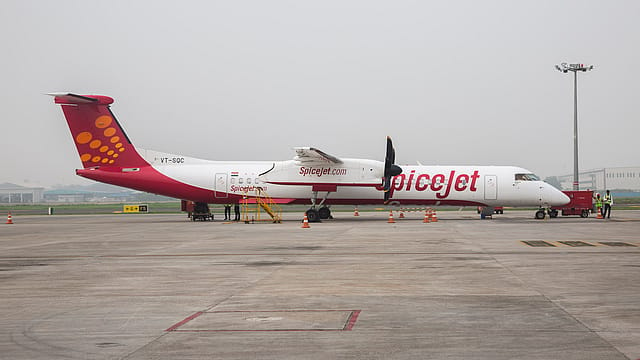SpiceJet surges 17% in two sessions on strong Q3 profit
ADVERTISEMENT

Shares of SpiceJet continued gaining momentum on Monday as investors cheered the aviation company’s strong performance in the December quarter of the current fiscal. The aviation stock has risen as much as 17% in two sessions after Ajay Singh-led low cost carrier reported 160% year-on-year jump in its consolidated net profit in Q3 FY23 on the back of soaring demand for air travel. The profit was driven by a strong performance in both its passenger and cargo businesses, but higher fuel costs and depreciating rupee impacted the carrier's profitability margins.
On Monday, SpiceJet shares opened 2.8% higher at ₹40.80 against the previous closing price of ₹39.70 on the BSE. In the opening trade, the stock gained as much as 4% to ₹41.3, while the market capitalisation climbed to ₹2,455 crore. In contrast, the BSE Sensex was down 345 points at 59,118 levels, tracking weak cues from global peers.
SpiceJet share price touched a 52-week high of ₹62.70 on March 10, 2022, while it hit a 52-week low of ₹32 on February 15, 2023, as investors remained worried about the debt-laden company’s ability to remain a going concern amid its eroding net worth. The stock has delivered a negative return of 32.5% in a year, while it has fallen 11% in a six-month period. In the last one month, the counter climbed 15%, while it added 4% on a year-to-date (YTD) basis.
The Gurgaon-headquartered embattled airline posted a net profit of ₹110 crore in the three months ended December 31, 2022, as against ₹42.46 crore, a year earlier. However, revenue from operations rose marginally by 2% to ₹2,317 crore in Q3 FY23, from ₹2,267 crore in the year-ago period, due to rise in operating expenses. The operating expenses stood at ₹2,687 crore in Q3 FY23, as against ₹2,579 crore in the same period last year.
On the operational front, the company posted Earnings before Interest, Taxes, Depreciation, and Amortisation (EBITDA) of ₹455 crore against a loss of ₹414 crore in Q2 FY23.
Despite a big jump in passenger traffic, business continued to be impacted by high fuel prices and depreciating rupee, the company said in its earnings report. During the December quarter, Aviation Turbine Fuel (ATF) price increased by around 48%, while currency depreciated by 11% (INR against USD).
Ajay Singh, Chairman and Managing Director, SpiceJet, said, “I am happy that SpiceJet has reported a profit in Q3 FY2023. We exceeded our operational targets and continued with our unmatched performance clocking the highest load factor for every single month in 2022. The profits have been driven by a strong performance in both our passenger and cargo businesses. There are renewed signs of recovery and some very positive developments and restructuring initiatives in the immediate offing that would significantly strengthen and deleverage our balance sheet.”
“Air travel has come roaring back touching newer heights and giving a glimpse of the huge potential of the Indian aviation market and we look forward to a robust and exciting 2023,” he added.
In terms of operational parameters, SpiceJet had the highest passenger load factor amongst all airlines in the country. The average domestic load factor was 91% for the quarter. The airline launched 15 new routes and operated 254 charter flights during the quarter under the review.